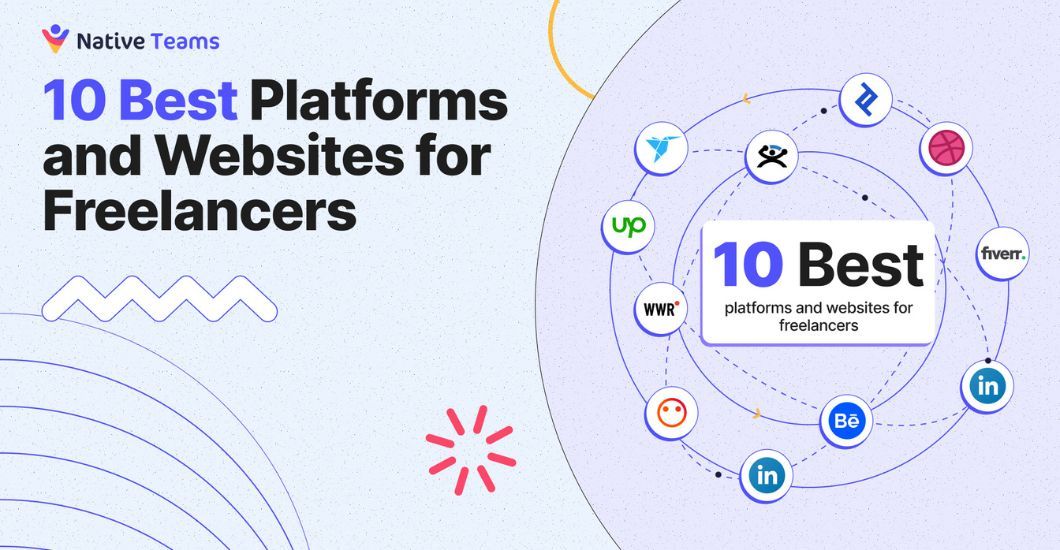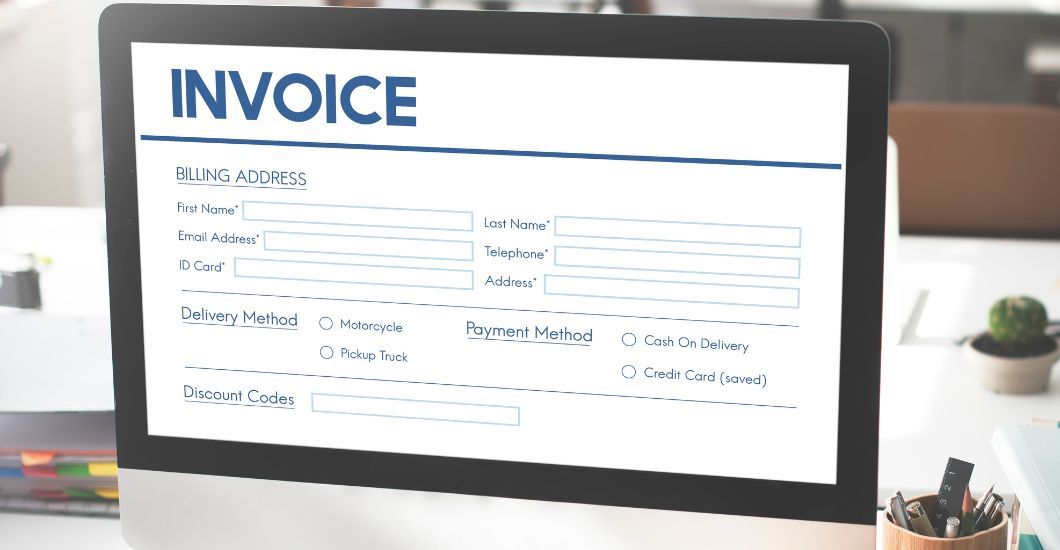10 Best Platforms & Websites for Freelancers To Use in 2025
With the expansion of the “gig economy,” more and more people are opting to work independently. One of the main draws of the freelance lifestyle is the chance to choose one’s own schedule and projects, both of which can help one to flourish personally and professionally.
The best way to attract more customers and secure enough work is to target the right market. The “right market” for freelancers is the “right” freelance site or platform where the freelancer will be selling their services from the get-go.
To make your hustle a little less of a grind, here are the best freelance websites to check out!

How To Choose Top Freelance Websites
The right website or platform can assist you in spending less time seeking employment so you can spend more time-on-task. Nevertheless, not all websites are made equal; some are intended solely for individuals with specific skills. Therefore, choosing the right platform to showcase your skills and find clients can be overwhelming as a freelancer because it can be challenging to confirm the platform’s credibility, employers, or clients without experience.
Thus, to simplify the process significantly, you should take into account the following considerations before choosing a website or platform to search for jobs:
1. Consider Your Niche and the Type of Work You Do
Whether you’re a sole proprietor, a small business, or a large corporation, your long-term growth and profitability depend on your choice of platform. Choosing the best channel to market your wares is a crucial step in your career progression, regardless of your field of expertise. While some sites are more general, others are geared toward certain fields, such as writing or design. Ensure that the platform you choose complements your expertise and the products or services you provide.
2. Platform’s Fee Structure
Depending on the platform, you may be required to pay a percentage of your revenue, a fixed cost, or buy credits in order to use the service. Think about how the price structure will affect your income and if it fits in with your long-term plans. Freelancing platforms that use a set rate structure should be avoided at all costs. The majority of your job will be paid for at a fixed rate that you are obligated to adhere to.
3. Platform’s Interface and Usability
If you’re trying to launch a successful freelancing career, having access to a user-friendly platform with reliable communication tools and helpful support staff can make all the difference. Finally, you should look into the platform’s credibility by reading testimonials and feedback from other users. This can shed light on the platform’s reliability, the level of client happiness, and whether or not other freelancers have had favorable experiences utilizing the site.

1. UpWork
No matter what kind of freelancer you are, Upwork has the potential to be one of the best websites where you can find work. For those with skills in web design, customer service, graphic design, or even freelance content writing, Upwork is a great resource.
While many freelance work opportunities are posted on Upwork, a large pool of applicants are also seeking those positions. To begin using Upwork as a freelancer, you must first create a profile. Remember to include information about who you are, what you can do, and your previous work history.
When submitting bids for jobs or pitching projects, remember that potential employers will quickly scan your profile to determine your qualifications. You’ll need to perfect the art of proposal writing, and you might have to bid below your pay rate first to gain a positive reputation.
Pros:
- – Clients on Upwork are typically eager to begin working with you right immediately;
- – A plethora of work options in almost every field.
Cons:
- – With so many users on Upwork, it might be challenging to gain attention.
2. Fiverr
Fiverr is a highly-optimized freelancing marketplace that connects businesses directly with freelancers in a variety of fields, including marketing, graphic design, programming, and more. Thanks to this website, freelancers and business owners alike will appreciate the ease with which they can communicate and collaborate.
It is important to remember that the website refers to freelancers as sellers, their services as gigs, and businesses as buyers. When compared to other freelance platforms, Fiverr operates a bit differently. You “list” your services on a website rather than “bid” for specific jobs.
Joining Fiverr as a “seller” is the first step toward obtaining work on the site. When a vendor creates a free account, they can offer their services and determine their own prices without sending out bids. Meanwhile, shoppers need only peruse a variety of tabs to find what they’re looking for.
Pros:
- – Freelancers are allowed to set their own rates and service bundles;
- – Both the website and the mobile app are really simple to use.
Cons:
- – Fiverr charges commissions at a high rate to freelancers.
3. Guru
Freelancers can quickly and easily set up profiles, promote their skills, search for work opportunities, and submit bids to prospective employers on Guru. This service will help you find a job that fits your skills, interests, and previous work history well. Freelancers are able to show their worth to prospective clients and streamline the hiring process with Guru’s integrated vetting system.
The site also makes it easy to get paid for your services by providing multiple payment options and a safe transaction method. This platform simplifies the process of searching for freelancing work and submitting bids to employers.
Using your prior work history and skill set, the algorithm will make employment suggestions. Freelancers can set their rates and bid on both long-term and short-term assignments. For freelancers, a basic Guru membership is completely free. Yet the service charges a 9% fee on any freelancing invoices paid through it.
Pros:
- – Guru adapts job postings based on requirements;
- – Suitable for professionals.
Cons:
- – You risk being approached by scammers posing as legitimate businesses on the platform.
4. Freelancer
According to its moniker, Freelancer.com is a website dedicated solely to posting freelance work. Freelancer is one of the top freelancing sites because of the large range of specializations it offers. Professionals in web development, social media management, and advertising will find plenty of opportunities on the site.
Freelancer users can quickly establish a professional presence by creating a profile, identifying the relevant talents and knowledge they wish to be known for, and completing the “verification center” process. After you set up a profile, you can search for openings that match your expertise and “bid” on them by providing employers with comments explaining why you’d be a good fit for the job.
Before submitting bids, freelancers can peruse their comprehensive job boards. After getting hired, you can use the platform to have live conversations with customers and monitor your progress. Freelance.com also offers contests, which are a great way to get noticed. The additional income and positive feedback will help set your profile apart from the competition.
Pros:
- – You can keep track of your development;
- – Many different jobs to apply for.
Cons:
- – Lots of competition.
5. PeoplePerHour
PeoplePerHour is a freelancer matching service that allows companies to browse freelancer profiles and portfolios for free. PeoplePerHour does not specialize in any one field but instead provides access to freelancers with expertise in many different areas, such as business and legal services, web design, and programming.
Freelancers can sign up for a profile and account on the site for free, but the site’s moderators must approve all new profiles. Once a profile is created, it becomes part of a larger database that potential employers can search to learn more about a candidate’s skills, experience, and previous work samples.
Likewise, contractors can look for freelancers for the project. The simplest way to find work is to wait for the AI system to match you with a task. However, you can also make a profile to draw in new customers. You can apply for tasks regularly posted on the site directly and design custom packages and price choices for various clients.
Pros:
- – Use an AI technique to match you with the proper employment quickly;
- – Location-based job listings.
Cons:
- – Freelancer applications are subject to review.

6. LinkedIn
It’s no secret that LinkedIn is one of the best places to find a job or advance your career because it’s a social networking site specifically for working people. You can construct a profile highlighting your credentials, work history, projects completed, and talents to potential employers.
LinkedIn isn’t a freelancer-specific job board like the others we’ve mentioned, but it does provide a number of chances for self-employed workers. LinkedIn is a great resource for freelancers, including designers, developers, copywriters, and more. LinkedIn has a lot to offer both newcomers and experts, but it’s not easy to be noticed there.
This platform has a high concentration of pros, which makes it challenging for newcomers to demonstrate their skills. However, the only way to rapidly advance your career is to be active, follow and engage with individuals in your sector. This is more than simply a resume because you can showcase your work for each position you’ve held.
Pros:
- – Numerous networking opportunities;
- – Give you access to the latest news and trends in your field.
Cons:
- – It can be challenging to stand out because so many professionals utilize LinkedIn.
7. We Work Remotely
We Work Remotely is a rare place where independent contractors are not required to pay any fees. There is no cost because an account is not required. It is only the company posting the job opening that must pay. When it comes to finding new freelance work, We Work Remotely is one of the most user-friendly websites out there.
There is no need to create an account to browse the most popular job listings in your field; simply visit the directory. If you want to apply for a job posting on the company’s website, all you have to do is click on the listing.
The website’s primary focus is connecting people with technical and programming skills with companies looking to invest in expansion. Professionals can find useful information about remote work on We Work Remotely.
Pros:
- – Free of charge for remote workers actively seeking employment;
- – Advanced search filters make it simple to find the perfect job for you.
Cons:
- – There is a lot of competition and no limitations on who can apply for each job.
8. Toptal
Toptal is a platform that facilitates the employment of a wide range of highly skilled remote workers. Software developers, project managers, and business consultants will find this website especially useful. TopTal has an application and approval process during which they will evaluate your experience and qualifications.
When they’re looking for someone with your expertise, TopTal will put you in touch with them. TopTal facilitates the establishment of billing and payment systems and provides introductions to clients around the world, thereby reducing the time and effort required to promote your services.
Although it can be difficult to break into Toptal, those who do so are rewarded with exposure to some of the biggest names in the industry. TopTracker is Toptal’s specialized solution for monitoring time spent on projects and generating invoices. Freelancers will be paid through this service, which can be done by PayPal, Payoneer, or a direct deposit into their local bank account.
Pros:
- – Less competition on the platform means better chances of being recruited;
- – The site’s stringent requirements mean only the most qualified experts make the cut.
Cons:
- – Gaining approval can be a lengthy and difficult process.
9. Behance
Behance is a platform for finding and sharing creative work and a community for its members. Artists, photographers, animators, and digital designers can now reach a massive audience with their work samples. Their visibility on the site increases the likelihood of them being contacted by customers all over the world.
You can gain exposure to other people who value your creative skills by uploading examples of your work to your Behance profile. Your project will receive even more attention if selected as a featured project.
Growing your network can help you connect with people who can help you get design jobs. Your ability to reach a large audience interested in art and design will increase if you fill your Behance profile with examples of your best work.
Pros:
- – Freelancers have the freedom to develop, disseminate, and consume original works;
- – Freelancers can use the platform to connect with other professionals worldwide.
Cons:
- – Many people use Behance, making it challenging to compete for positions there.
10. Dribbble
Dribbble is an incredible online portfolio for artists and designers to share their work with the world. Developers of user interfaces and user experiences and product designers, visual designers, brand designers, etc., will find a wealth of resources on this site.
Sharing your web design portfolio with potential employers has never been easier than on this site. One of the best ways to promote yourself and your skills to potential employers or clients is to create a polished Dribbble profile. Many companies use Dribbble to find talented designers to fill open positions.
A stellar bio and a sampling of your finest work are all required. The toggle on Dribbble is simple to use and allows you to change your work availability status whenever you like quickly. In addition, at the Pro level, you’ll have entry to a separate job board for freelance designers only.
Pros:
- – This platform connects you with a global community of employers and industry experts;
- – It features the works of numerous talented artists and designers.
Cons:
- – Pro subscribers are the only ones who can access freelance work opportunities.

Wrapping Up
Freelance websites and platforms are great opportunities for both amateurs and experts. On these sites, freelancers will have the opportunity to market their skills, set their rates precisely, and promote themselves well to succeed.
So, in order to find the platform that works best for you it’s essential to thoroughly research and evaluate many options. After all, the best platforms for you will depend on your needs, preferences, and skill set.
